Life on Paradise Island
- Aaron Schorr
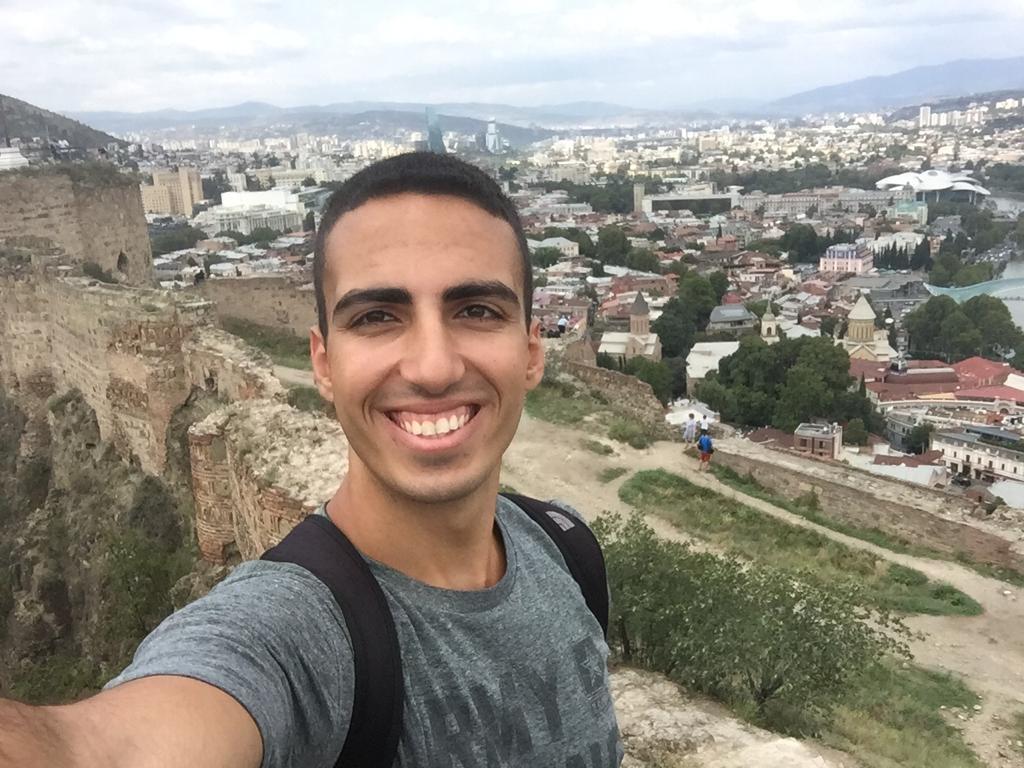
- Dec 24, 2019
- 13 min read
Let your mind wander and picture a paradise island. Gentle waves hug soft sandy beaches and geese cruise by as your boat approaches the shore, clear freshwater surrounding the island on all sides. Past the beaches, flat land provides space for quaint villages. The terrain rises dramatically towards the center of the island, where a tall ridge provides a reminder of a now-extinct volcano, with dramatic waterfalls cascading down the steep cliffs after rainfall. The fecund soil allows fruit trees, bushes and shrubs to grow in every plot of earth, giving the island the appearance of a verdant emerald from afar and providing ample shade. The climate is warm and sunny all year round, the air is clean and clouds cling to the mountaintops before vanishing in the distance. The locals are friendly and hospitable, waving and smiling at unfamiliar faces as they pass by, and jubilant children play in the streets. Crime is unheard of, cars are a rarity, and chickens, cows, and goats roam freely between houses. Songbirds, dragonflies, butterflies and crickets fill the air, with birds of prey lazily riding the thermals near the highlands. The sun sets in a blaze of colors over the lake, the water providing it with a fresh canvas every evening. As darkness falls, fireflies light up in a thousand specks of gold, the crickets chirp louder and millions of stars come out, unimpaired by light pollution to watch over the island until the sun comes back the next morning. This is no utopia; this is Mfangano Island in western Kenya.


The Catch

The idyllic surroundings can be misleading; life is hard here. In a country where the GDP per capita is under $2,000, Mfangano is below average in terms of income, and the poverty and distance from civilization certainly take their toll. There is no industry, employment is scarce and not a single road is paved on the entire island, turning the dirt paths linking the different villages to deep mud when the rain falls and making trips between villages all but impossible for long periods of time. I first arrived, overnight rain had turned parts of the road to mud that reached over the foot-pegs of the motorbike and subsequent nights brought yet stronger rains.

The island depends on a lifeline from the mainland for everything that isn't grown on it, making product shortages a regular occurrence and fuel prices higher than on the mainland (roughly $1.2, nearly 0.1% of yearly GDP per capita, for a liter of petrol). Power is generated locally in the main town of Sena, but the generators are old and their power supply unreliable. This, along with income levels, is one of the reasons that refrigeration does not exist in the island's homes, apart from a handful of high-end tourist resorts built to Western standards with their own generators. Transportation to and from the mainland is handled by a pair of locally-operated water buses, unrated for nighttime navigation and operating from 7 am to 2 pm. Each household collects its own trash, with no garbage services to be found, and many beaches are covered with trash.

Polygamous Catholic Family Compounds
I have been staying with Samuel and his family in their home on the south shore of the island, just outside the village of Kitawi. The family is Roman Catholic, but Samuel has two wives - Grace, approximately his age, who has 7 children, and Marilyn, who is slightly younger and has 4. The family lives in a compound of small houses, a typical living arrangement for what passes here for middle-class families. The largest and most comfortable house is Grace's, a slightly smaller one is Marilyn's home, and a small building in between is home to two boys of about 11 (Grace's son and Samuel's nephew whose family lives on the mainland), who are often joined by a local relative their age. Foreign guests staying with the family also sleep here, and the oldest son, Dennis, lives in a separate house nearby, the only one without a concrete floor (Marilyn's floor is being poured as I write this). A fifth house is under construction for Charles, 16, and Gabriel, 14, since Kenyan law dictates every son must have a home on his father's property. Upon having children, the sons buy land and start the process afresh with their own families; the daughters move in with their husbands after marriage. Each wife runs her own household, each of which has a dog, chickens and goats, and is responsible for laundry, dishes, and meals for herself and her children. Most of the action, however, is at Grace's house, where guests and most members of the family have their meals. The children cross between the houses with frequency inversely proportionate to their age and Samuel goes back and forth quite a bit, but the wives never do. Even the chickens know which side of the invisible line is theirs and do not cross it. Polygamy is a common practice on the island. Bernard, Samuel's friend and business partner, lives just down the road with a similar arrangement. Any man who can afford it, he says, marries two women, with a wealthy man in the area known for marrying 20 and providing each one with her own home. Christianity, which has a firm footing on the island, doesn't seem to have made much progress on this front.
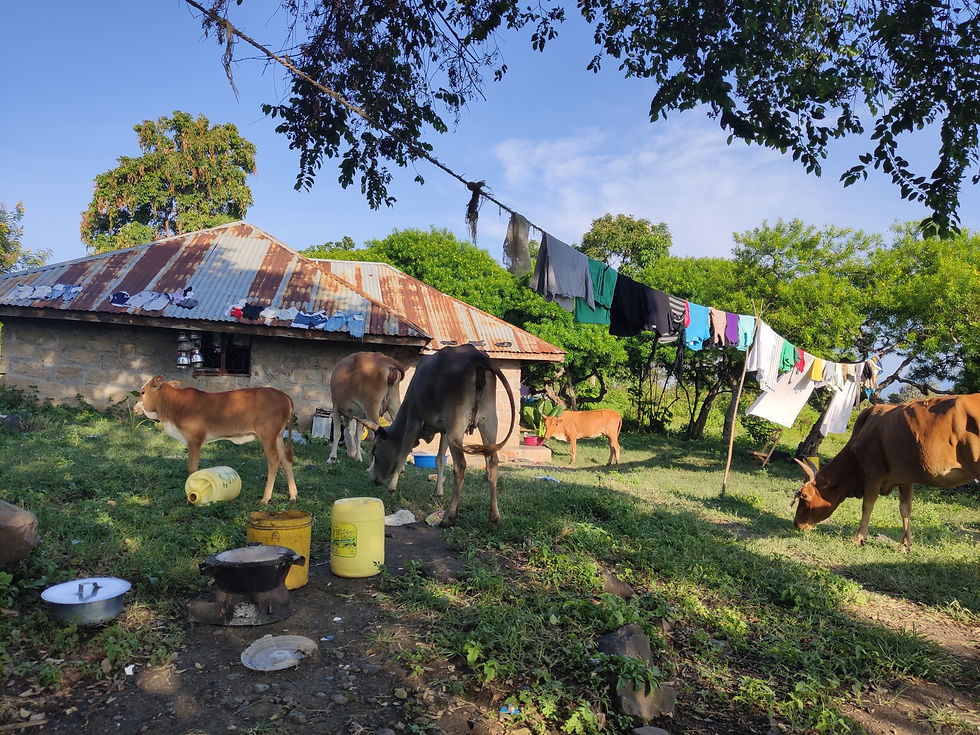
Apocalyptic Rain and Laundry in the Lake
The buildings are all single-story, with concrete floors and sloped roofs made from corrugated metal, usually with a gap between the walls and the roof covered in steel mesh, which lets air in but not bugs. The windows have bars and curtains but no panes, so when the rain comes down on the tin roof it sounds like the world is coming to an end. The wives' houses are the only ones connected to the power grid; the others have solar-powered lights but no outlets. Meals are prepared exclusively by the women, Grace and her three daughters (22, 18, 13) laboring for hours every day to cook three meals over an open fire or a portable gas stove. They collect firewood from nearby to feed the fire, with the boys often lending a hand and collecting from further away, as good wood is plentiful on the lush island. The lack of refrigeration means every meal is as fresh as it gets and the lack of kitchen appliances means recipe complexity has a firm glass ceiling; leftovers are shared between the chickens and the dogs.
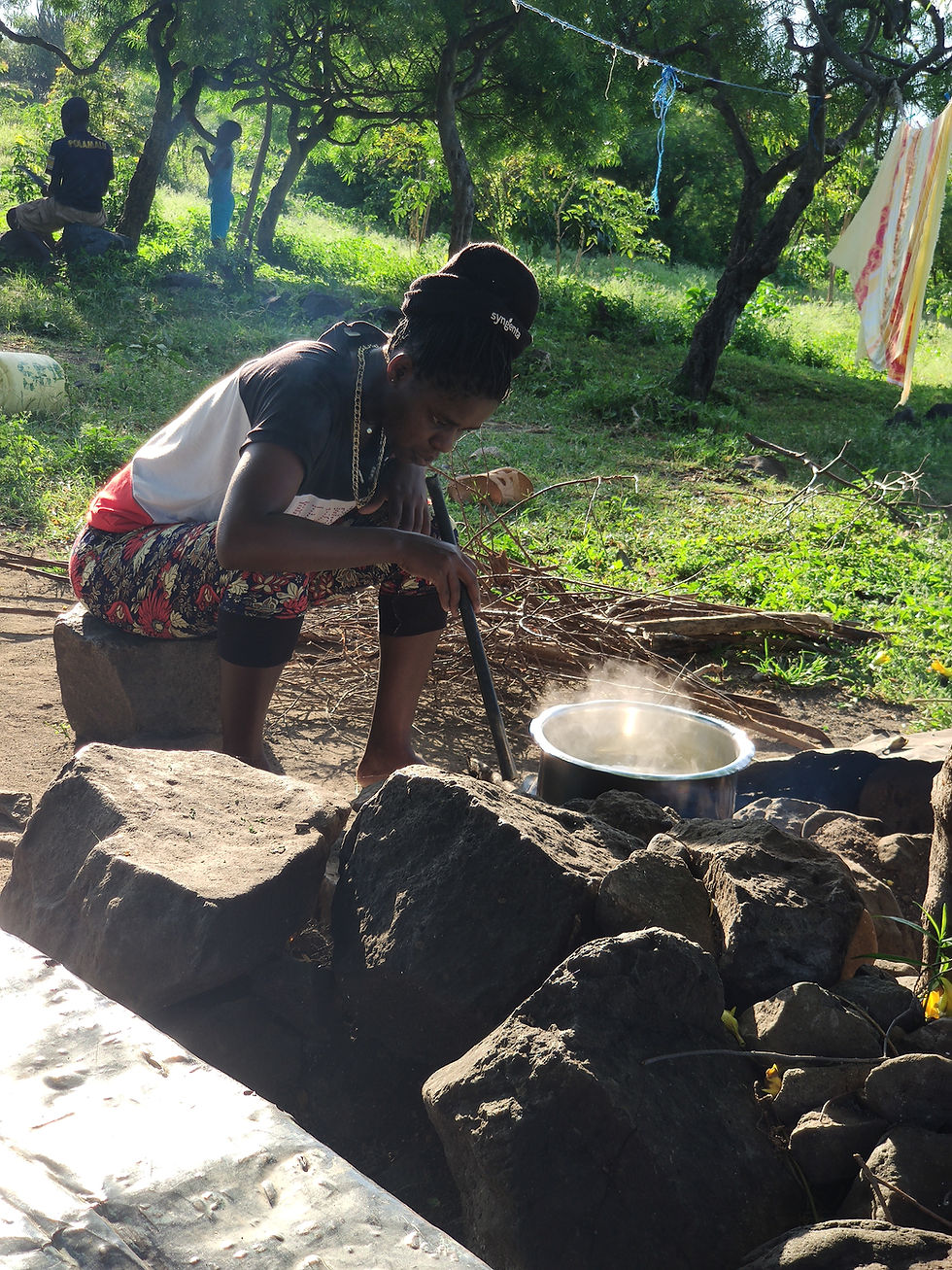
Running water is a fantasy on most of the African continent and rural Kenya is no exception. Samuel's family efficiently collect rainwater, generally collecting enough during rainy seasons to last them the dry seasons. The water is stored in large plastic vats and purified with tablets subsidized by a Western NGO, giving it a taste not unlike some Western tap water. Less savvy islanders, who don't want to make the effort to collect rainwater or don't care about the health effects, drink water directly from the lake, often without purifying it. Practices in other parts of Kenya are even worse, with most regions not having access to relatively clean lake water and drinking from muddy and polluted rivers. Outhouses made of corrugated metal can be found on every property (thanks again to a certain night spent near the Georgian-Abkhaz border for teaching me that particular skill), and anyone living within walking distance of the lake uses it to bathe and do laundry, which like anything else in need of transportation is carried by the women in plastic containers balanced on top of their heads. I've been in Africa exactly two weeks and I have yet to have a proper hot shower. Though I definitely miss showers (and bathrooms), bathing in the lake is idyllic and peaceful, really making you feel connected to nature, though it does take some getting used to (especially when other people suddenly show up mid-shower). The other inconvenience is that I can't shower before bed, since swimming alone after sunset at a deserted beach is not a good idea. The bathing beaches can be found by spotting narrow trails heading into the bush by the roadside and the locals are all familiar with the unofficial division between male and female beaches.
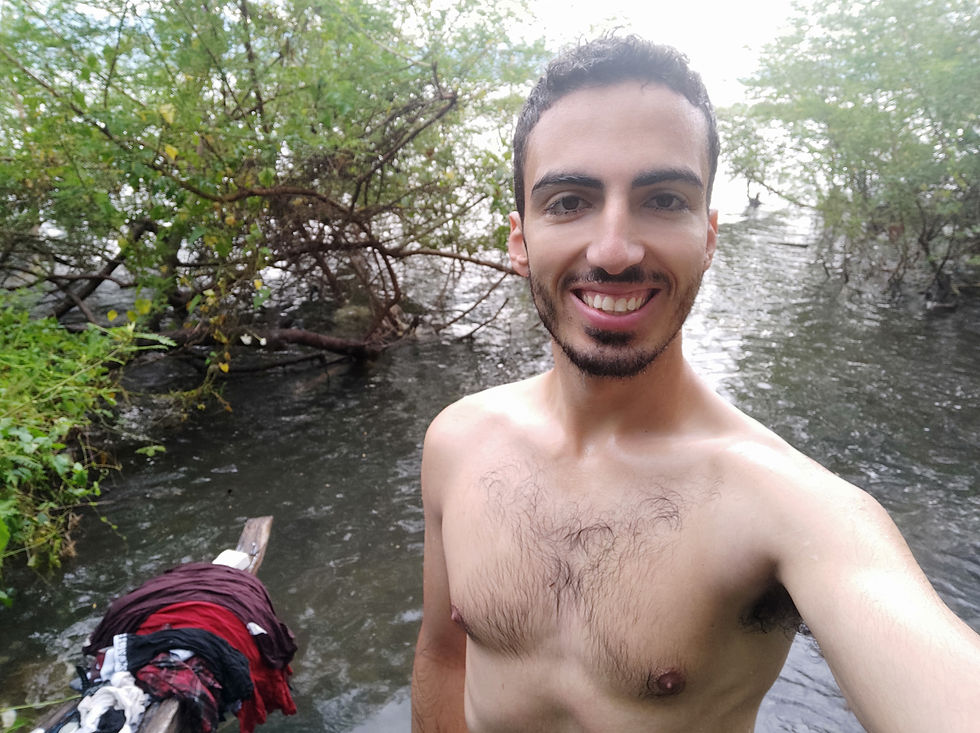
Loaves of Maize with Cooked Bananas
The main downside of rural living in Africa is the food. The food is fresh and healthy but the diversity leaves a lot to be desired. Food variety, I understand here, is the result of refrigeration and efficient supply chains, neither of which exists here or in other, similar communities. For the past few weeks, my diet has been even more repetitive than in the army: breakfast is white bread (the most recent addition to the local diet) or mandazi, a kind of unsweetened donut, with cloyingly sweet tea, lunch is ugali, an loaf of densely packed maize, or occasionally rice with kale salad and either fish or beans, and dinner is generally either more of the same with a different type of protein or chapati, fresh flatbread made on a pan over the fire, with more tea. Soy, cassava, and cooked unripened bananas (which taste more like potatoes than anything else), have also made an appearance. Fish, which is eaten at least once a day, is freshly cooked after being fished nearby the same day and meat is by and large reserved for special occasions and Sundays. Honestly, the people basically eat kosher, apart from the occasional meat dish. I almost deleted that sentence after discovering people trap and fry insects that look like mosquitos but don't bite (and show up in huge clouds after rain), but thankfully the practice has all but ceased in the last 2 generations.

Ugali is the main food staple in Swahili-speaking territory, stretching from the Indian Ocean coast to the jungles of the Congo, but it's not exactly a Western taste. Other versions of it exist, including a tasty one made with millet and cassava. The locals roll it with their fingers and mix the balls with whatever else there is to eat; I use silverware with less dexterity (Jewish mother habits die very hard).

Partners in Crime
The first week I spent on the island was shared with Monique, a Danish-German woman who came to Mfangano to relax and experience rural African life. She quit her job as a travel agent in Berlin, came to Africa to travel, and fell in love with a Congolese rapper she met at a party in Uganda. She was now planning a move to Kampala, using Facebook to look for a job and a place to live as her money rapidly depleted. She was very into spirituality and mindfulness so we weren't exactly a natural match, though it was very nice to have another Westerner around as a barometer for my sanity. A few days after my arrival we were joined by Lizzy, an Austrian woman who runs an guesthouse in the mountains outside Rome. She works every day for 9-10 months a year and spends the low season traveling, making her quite well-traveled and an interesting conversation partner. We shared the same mixture of pity and frustration at the problems we were exposed to, shaking our heads together at the absurdity that is 21st-century Africa (more on that in a later post). There is apparently an orphanage run by Spanish volunteers down the road, but I have yet to visit, though I suspect I'll need more Western company soon.

Forced Relaxation at BP Studios
Mfangano is by far the most laid-back place I've ever visited. Nobody is ever in a rush, things are done pole pole ("slowly slowly", think Mediterranean but more extreme), and the most minor inconveniences can make everything wait until later / tomorrow / an unspecified point in the future. It's a nice environment for vacation and it provides some insight into how so many people just seem to chill all day, but it makes any type of work rather frustrating . Young women sit in their small shops for hours with hardly a customer in sight, while men sit in groups with their motorbikes, waiting for passengers who may or may not exist. Despite the island chill culture, not everyone subscribes to the slow life. Samuel and his partners at the Sagrema Foundation are busy with many projects in the community, albeit at a more relaxed pace than other community-based organizations I've encountered in the past. Besides lending a hand drafting grant proposals for the Foundation, my main project here has been making a video presenting the Foundation, its projects, and their impact on the island's population. I'm a one-man production team (I like to think of myself as "BP Studios"), in charge of scripting, set scouting, shooting, interviewing and post-production, lacking an Internet connection in the house and using only my phone and a very rudimentary laptop (have you ever tried editing HD video on a laptop with 2 GB of RAM? You shouldn't). It's a unique and rewarding challenge, helping me see the island differently as I'm always searching for people and places to film. The best part is that the people I'm shooting are good fun to work with, excited to be on camera and always eager to help. One of the many projects Samuel is involved in is women's empowerment groups, several of which exist on different parts of the island. The groups mainly help their members run small businesses and provide financial assistance for the women to send their children to school. I attended a meeting which took place at Marilyn's house and consisted of Samuel and Bernard explaining to the 20 or so participants how to apply for loans for their businesses and what the different conditions were. I found the irony of a women's empowerment group being lectured by two polygamists at a "second-class" wife's house beyond precious but I don't think anybody else did; just another sign of how different African culture is.
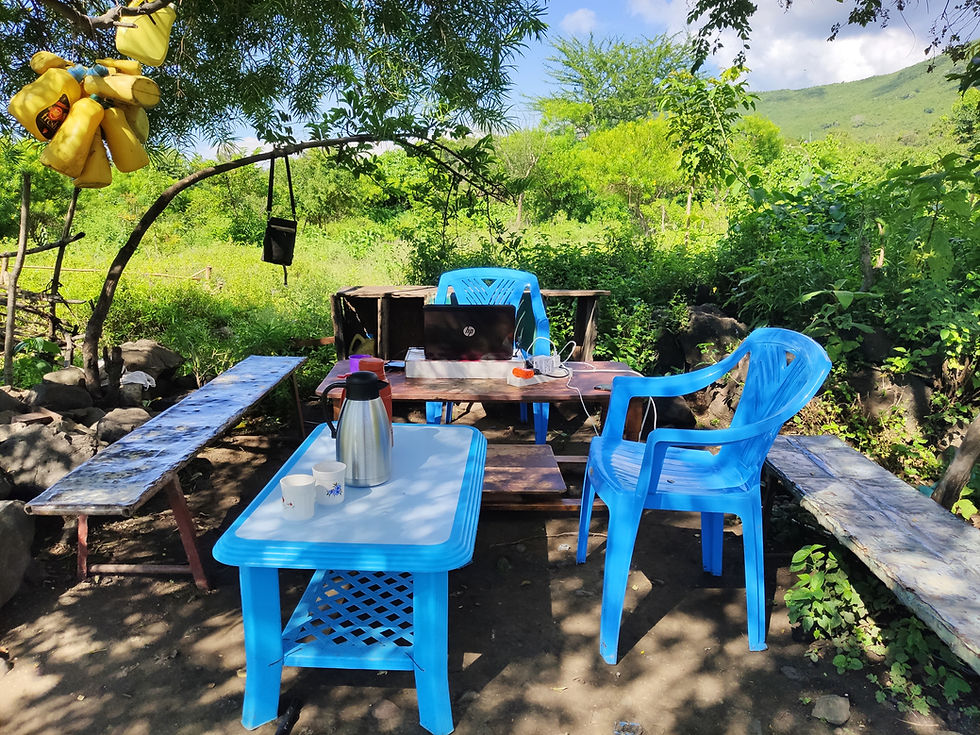
The Muzungu Diaries
My white skin makes me an instant celebrity just about anywhere I go and it's a very strange feeling, like being an ordinary person who becomes famous overnight after winning a reality show. I can't go anywhere unnoticed, but people's reactions mostly vary with age. Adults generally either say hello in English or nod, some stopping to shake my hand, people near my age often strike up a conversation and some ask me to take their picture, but neither comes close to the children. Walking down the road, I can hear calls of "muzungu!" (literally, "white person") from far away, smiling children waving at me as I get closer, cracking up at any reaction they provoke, with the braver ones approaching to shake my hand and even following me around. A group of four small children by the so-called harbor in Sena went so far put on a show for Lizzy and me, trying out their English skills ("How are you, muzungu? I am five"), playing some version of "red fish, blue fish" to see who could get closest to us before running back and following us all around town while gleefully chanting "muzungu".

The best foreigner moment, however, was when a boda driver offered to let me have a go with his motorbike on the way back from the Sunday market at Sena. Being the licensed rider and cocky foreigner that I am, I was sure it would be a piece of cake, but bodas are nothing like anything I've ever ridden in Israel (think WWII motorcycles with fickle clutches, choke valves, and kick-starters, but built in India with cost-saving in mind). I promptly stalled the bike twice, much to the amusement of everyone nearby, who formed a crowd and started cheering until the driver gave up and tried to teach me while he drove (I later pulled it off in front of a smaller crowd). Mfangano is relatively accustomed to white tourists, with 2 luxury hotels and plenty of Western NGOs active on the island, so I can only imagine what places further off the beaten path are like.
"Have You Seen Jesus' Cross?"
The family are an African breed of devout Catholics, with Christian posters lining the walls of Grace's house and multiple active members of the local church. As a native of Jerusalem, they take a particular interest in my hometown. Over and over I'm asked if I've been to the places where Jesus lived (yes), whether the stories actually happened (I truly have no idea) and whether Jesus was actually the son of God (I don't believe so but many people do). Their eyes positively light up when I show them pictures I've taken of the Church of the Holy Sepulcher and the Church of the Nativity. I tell them I'm Jewish, but they mostly don't really know what that means and some of the kids think it's just another Christian denomination. When I tell them only about 2% of the population of the Holy Land is Christian their reaction approaches horror; to them, Israel is some sort of religious utopia-cum-theme-park. Grace's sons Charles, 16, and Gabriel, 13, think my beard and skin tone make me look like Jesus; I guess I'll take that as a compliment.

Antenna Scaling in Pink Crocs
Monique and I planned to hike over the mountains to the other side of the island with a friend of Samuel's who lives in the highlands, but strong rains foiled our plans. Charles was happy to take us up part of the way instead, with Gabriel tagging along as well. The way up was far from a cakewalk, with seemingly every second plant covered in thorns, steep slopes of loose soil and damp, heavy air, but we were about to be humiliated. Scrambling up the mountainside and attempting to not lose our footing, Monique and I gaped at Gabriel, who was wearing pink Crocs, but even he paled in comparison to a local woman we saw on the way up, who balanced a sack of rice in a plastic basin on her head and made it to the top with her hands free. We were aghast. The local women typically carry things on their heads with no hands, but this was practically a circus act.

We finally made it to the top, drenched in sweat and puckered by thorns, where we walked through tranquil villages with adorable children happy to see us and instantly drawn to my camera.

We met one of the local men and Charles said to follow him. Turns out he was the groundskeeper of an antenna installation at the top of the mountain which he proudly showed off to us, where an FM radio station in the local Suba language is broadcasted to the surrounding area. The language used to be spoken by everyone on the island, but after generations of intermarriage with women from the Luo tribe from the mainland it's all but extinct, spoken almost exclusively by the older men. This turned out to be a great turn of events, since the island is so heavily wooded that the only spot that offered a good view was at the top of the antenna, which was practically built to be climbable. I was the only one who actually climbed up, though Gabriel posed on it, catching a view of the Rusinga Channel, the surrounding islands, and even the distant shores of Uganda.

A long and bumpy path, though thankfully not as steep as the way up, brought us down to Sena, where I would've paid good money for a cold drink if there were any to be had in a 3-mile radius. Instead, a long walk in the fierce sun brought us home, where the lake was more inviting than ever.
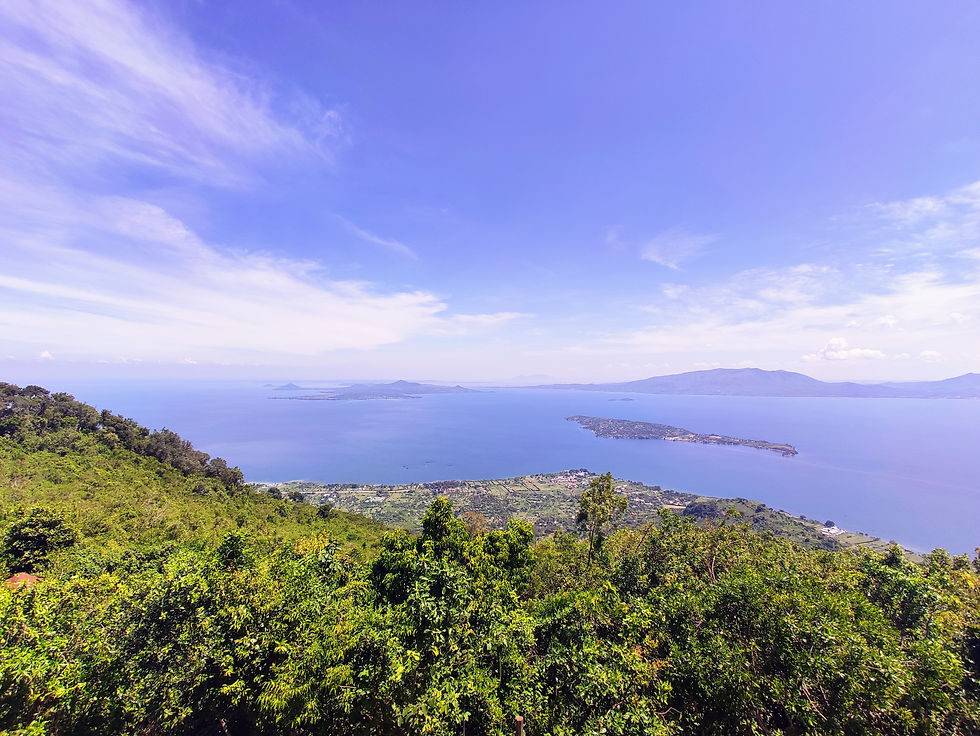
"All Whites Become Red Here"
Brenda, Grace's 18-year-old daughter, calls me "unique Aaron", a nickname that owes its origin to my limited lake laundry skills (all the women in the household had a good laugh after she asked me to demonstrate how I apply soap to my clothes). Her insights into white culture are on point. "You are very clean," she says, "you are the only white who goes to the lake every day." I suspect most of the Westerners who end up here see that none of the houses have showers, think that Africans never shower and seek to emulate them, much to the disdain of their host families who share close quarters with them. "All whites become red here," she confesses, "they don't know how to live in the sun." Touché, Brenda, even my Syrian genes couldn't prevent my arms from turning red after a few days in the equatorial sun. To be honest, I've never spent so much time outside in my life. Just about everyone spends the days outdoors, as the buildings get quite hot in the middle of the day, but shade is plentiful and it never gets too hot. Being outside is a real joy, with beautiful views of the lake and the island in all directions and a slight breeze blowing all day long.
I'm going to stop this post here, as it's already quite long and with Christmas and New Years coming up I'm sure to have more good stories. Stay tuned for part 2 coming soon!


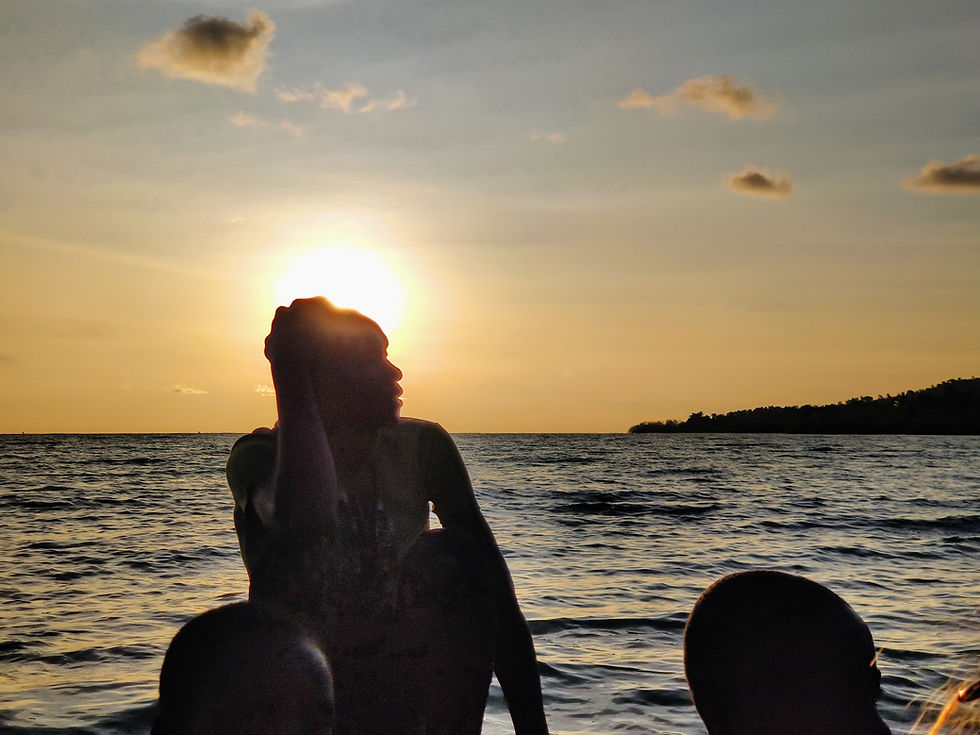






Very little. Most of the soil is fertilized with plant matter and animal dung; the market town sells some pesticides but I haven't seen any other chemical products.
Looks beautiful.
I'm glad to hear that you're very clean.
What kind of "farm inputs"do they sell at the depot?